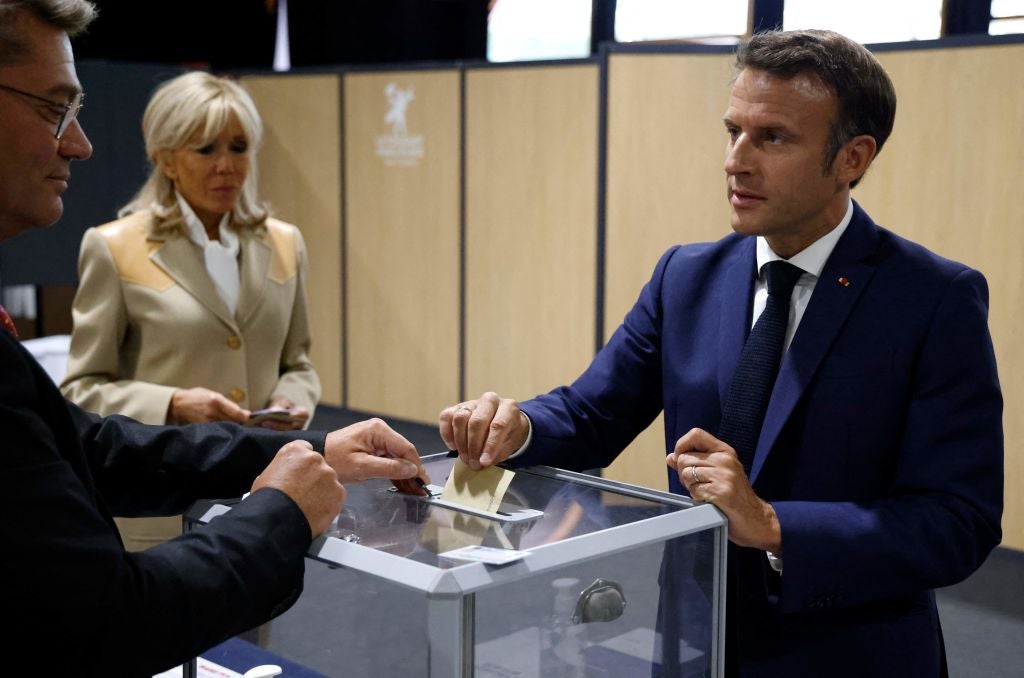French election: Macron’s centrists expected to keep parliamentary majority after first round of voting
Macron’s party and its allies got about 25 per cent of the vote, according to projections

Your support helps us to tell the story
From reproductive rights to climate change to Big Tech, The Independent is on the ground when the story is developing. Whether it's investigating the financials of Elon Musk's pro-Trump PAC or producing our latest documentary, 'The A Word', which shines a light on the American women fighting for reproductive rights, we know how important it is to parse out the facts from the messaging.
At such a critical moment in US history, we need reporters on the ground. Your donation allows us to keep sending journalists to speak to both sides of the story.
The Independent is trusted by Americans across the entire political spectrum. And unlike many other quality news outlets, we choose not to lock Americans out of our reporting and analysis with paywalls. We believe quality journalism should be available to everyone, paid for by those who can afford it.
Your support makes all the difference.French president Emmanuel Macron’s centrist alliance is expected to keep its parliamentary majority after the first round of voting in the elections, but will likely have far fewer seats than five years ago, according to projections.
Projections based on partial election results showed that at the national level, Mr Macron’s party and its allies got about 25 per cent of the vote.
That was neck-and-neck with estimates for a new leftist coalition composed of hard-left, Socialists and Green party supporters. Yet Mr Macron’s candidates are projected to win in a greater number of districts than their leftist rivals, giving the president a majority.
France‘s two-round voting system is complex and not proportionate to the nationwide support for a party. For races that did not have a decisive winner on Sunday, up to four candidates who got at least 12.5 per cent support each will compete in a second round of voting on 19 June.
Following Mr Macron’s reelection in May, his centrist coalition was seeking an absolute majority that would enable it to implement his campaign promises, which include tax cuts and raising France‘s retirement age from 62 to 65.
Yet Sunday’s projection shows Mr Macron’s party and allies could have trouble getting more than half the seats at the Assembly, much less than five years ago, when they won 361 seats. Polling agencies estimated that his centrists could win from 255 to over 300 seats, while the leftist coalition led by Jean-Luc Melenchon could win more than 200 seats.
Sunday’s turnout reached a record low for a parliamentary election, with less than half of France‘s 48.7 million voters casting ballots.
Prime minister Elisabeth Borne said: “We have one week of action, one week to convince, one week to get a strong and clear majority.”
“Faced with the situation in the world and the war at Europe’s doors, we cannot take the risk of instability,” she added, urging voters to gather behind Mr Macron’s alliance in the second round. “Faced with extremes, we will not yield.”
Mr Melenchon, who had hoped the election would vault him into the prime minister’s post, did not accept the preliminary projections, insisting that his coalition came in first. “Projections in numbers of seats at this hour make quite no sense,” he said.
He urged the French to choose his coalition’s candidates in the second round and “definitively reject the doomed projects of the majority of Macron.”
His platform included a significant minimum wage increase, lowering the retirement age to 60 and locking in energy prices, which have been soaring due to the war in Ukraine.
Even though Mr Macron beat far-right rival Marine Le Pen in the presidential runoff, France‘s parliamentary election is traditionally a difficult race for far-right candidates. Rivals from other parties tend to coordinate or step aside to boost the chances of defeating far-right candidates in the second round.
Projections showed that Ms Le Pen’s far-right National Rally party could get 10 to 30 seats — up from eight five years ago. If it passes the threshold of 15 seats, it can form a parliamentary group and gain greater power at the assembly.
Ms Le Pen, who ran for reelection in her stronghold of Henin-Beaumont, in northern France, praised Sunday’s results.
“Next Sunday, it is important not to let Emmanuel Macron get an absolute majority, which he will abuse to implement his self-centered and brutal methods and impose his anti-social project,” she said.
She called on voters to vote blank or not go to the polls in districts that have only Mr Macron’s or Mr Melenchon’s candidates.
Additional reporting by Associated Press.
Join our commenting forum
Join thought-provoking conversations, follow other Independent readers and see their replies
Comments